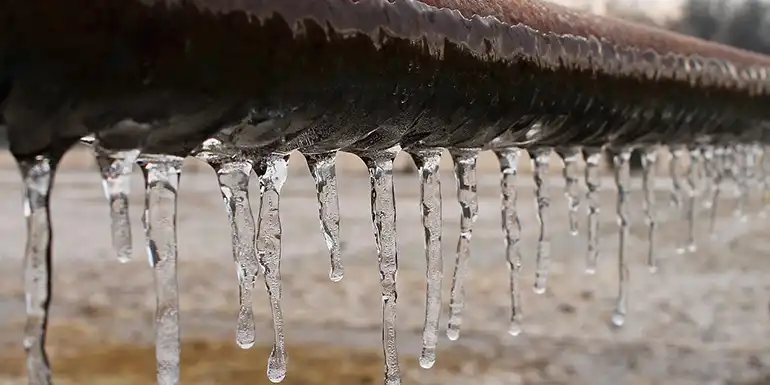
Frozen pipes may seem like a minor inconvenience, but anyone who has dealt with them can testify to their destructive power. A mere frozen pipe can quickly cause your pipes to burst and cause severe water damage all over your home.
As you can guess, preventing a situation like this is better than cleaning up after one that has already happened. We’ll share a few tips and home upgrades that can help you prevent frozen pipes from bursting.
Basic Tips to Prevent Frozen Pipes
Frozen pipe prevention doesn’t have to cost you anything. Many of the most widely used prevention methods are cheap or free. Here are some ways you can prevent frozen pipes on your own:
- Leave your taps dripping: Moving water stays in contact with cold pipes for a shorter time and is generally less likely to freeze. It’s the same principle that keeps rivers flowing while lakes freeze.
- Run the heater: You should be running your heater when temperatures reach below freezing, but if you aren’t, know that it can help keep your pipes working effectively.
- Increase airflow to your pipes: Opening up cupboards and cabinets near your pipes increases the likelihood that the air from your heater will warm them. You can use this method to thaw frozen pipes as well.
Home and Plumbing Upgrades to Prevent Frozen Pipes
If you’re a little further north and using a heater or dripping tap isn’t cutting it, investing in better insulation can help. Here are a few ways you can insulate your pipes to prevent them from freezing in winter:
- Add pipe insulation: Pipe insulation does exactly what it sounds like it does. We use heat tape and other insulating materials to wrap your pipe. This insulation keeps the pipe’s temperature stable, which not only prevents pipe freezes but also makes your plumbing and water heater more efficient.
- Air sealing: Air sealing is a form of foam insulation that wraps around your pipes. It’s easier to install than many other forms of insulation.
- Insulate your home: Insulating your home more effectively can help you avoid pipe freezes without pipe-specific insulation. While it’s not as good at preventing these freezes as pipe insulation is, it does make your home more comfortable and energy efficient.
Frozen Pipe Prevention FAQs
How do I stop my pipes from freezing?
Hiring a plumber to install pipe insulation is the best way to prevent frozen pipes. However, if you live where cold weather is infrequent, some other methods can help prevent them on the rare occasion that temperatures dip below freezing.
After locating a frozen pipe, increase the airflow to it by opening up cupboards and cabinets to ensure that it comes into contact with warm air. This can reduce the chance that your pipes become cold enough to freeze water.
Leaving your taps dripping is one of the best ways to prevent your pipes from freezing. Moving water is less susceptible to freezing and retains its temperature better than standing water.
Will frozen pipes thaw on their own?
Frozen pipes will thaw on their own, but allowing them to do so increases the risk of damage to your plumbing. In the worst case, frozen pipes can stay cold and burst the pipe.
To thaw a frozen pipe, you can use a space heater near the pipe. Be careful not to put the heater close to anything flammable.
The best bet when it comes to thawing a frozen pipe is to hire a professional plumber. They can thaw pipes quickly and prevent damage from pipe bursts.
Prevent Frozen Pipes with Help from Mr. Rooter
Frozen pipes are a common and serious issue. Left alone, they can rapidly worsen and spread damage throughout your home. Don’t be caught off guard when temperatures plummet. Contact Mr. Rooter for help installing pipe insulation or if you need frozen pipe repair.

